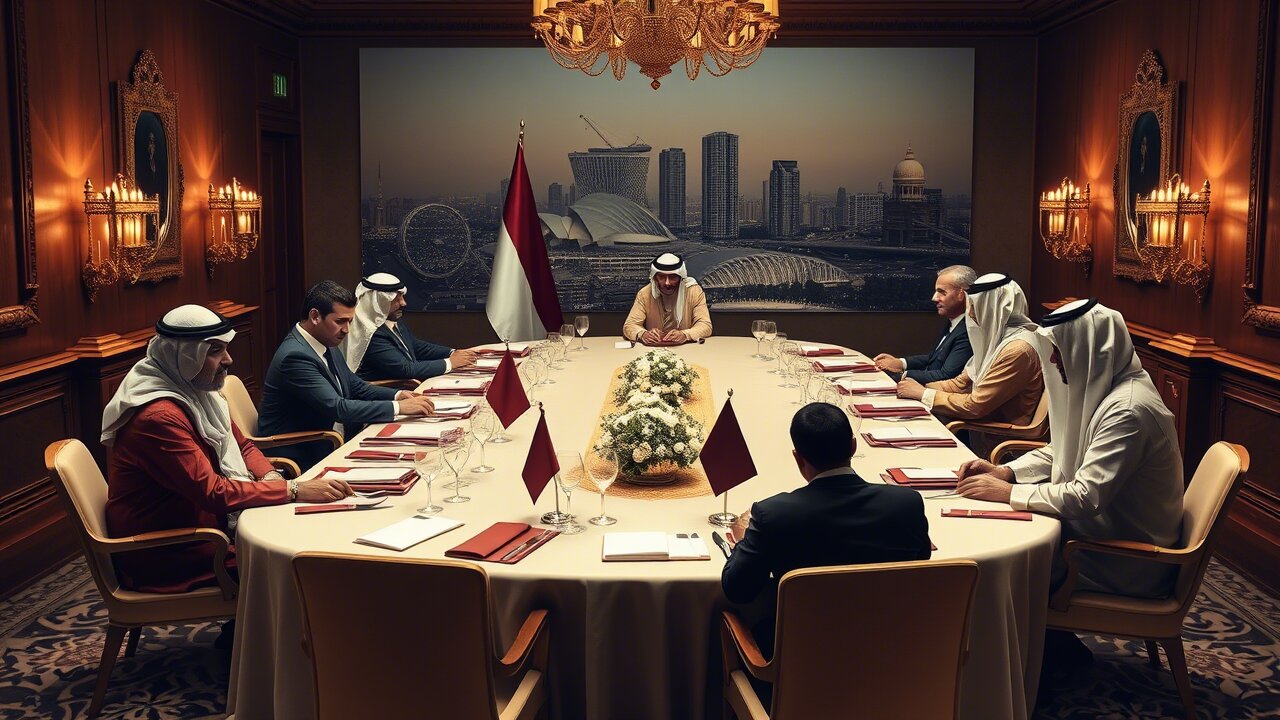Premium Only Content

🔥 Between Allies and Enemies: Qatar’s High-Stakes Diplomacy 🔥
**Qatar's Delicate Balancing Act Between Iran and the West**
Qatar appears to be walking a tightrope in its relations with Iran, especially as tensions between Iran and Israel over Tehran's nuclear program continue to escalate. Recently, Qatar has drawn criticism from the West for seemingly aligning itself with Iran, a country that is increasingly at odds with Israel and the United States. This has raised questions about Qatar's strategy: is it trying to avoid becoming a target in a potential conflict, or is it simply hedging its bets to protect its own interests?
Qatar's Prime Minister, Muhammad bin Abdulrahman Al-Thani, recently made headlines during an interview with Tucker Carlson, where he suggested that Qatar would stand with Iran if the West initiated hostilities. This statement is significant, given Qatar's close ties with the United States, including hosting the largest American military base in the Middle East, Al Udeid Airbase. Qatar is also a key non-NATO ally in the region, making its apparent alignment with Iran a surprising shift.
However, this stance isn't entirely unexpected. Qatar shares a significant gas field, the South Pars/North Dome, with Iran, which has fostered a pragmatic, if not always friendly, relationship between the two nations. When Saudi Arabia and its allies imposed a blockade on Qatar in 2017, Iran stepped in to provide support, further solidifying their bond. This history of cooperation, coupled with Qatar's geographic proximity to Iran, makes it logical for Doha to seek to maintain good relations with Tehran.
**The Risks of Hosting a U.S. Military Base**
Qatar's position becomes even more precarious when considering its role as a host to U.S. military forces. If Iran perceives that Al Udeid Airbase is being used to launch attacks against its territory, Qatar could become a legitimate target for Iranian retaliation. Iran has a range of options at its disposal, from ballistic missiles and drones to cyberattacks and disruptions in the Gulf. Qatar's economy, heavily reliant on its gas exports, could suffer catastrophic consequences if Iran decides to target its energy infrastructure.
Moreover, Iran could leverage its regional proxies, such as Iraqi militias or Yemeni factions, to strike at Qatari interests. Cyberattacks on Qatar's financial institutions or energy sectors could also cause significant damage. The stakes are high, and Qatar's ability to navigate this complex landscape will be critical to its survival.
**The Diplomatic Tightrope**
Qatar's strategy has long been one of neutrality and mediation. The country has a reputation for engaging with all sides, from hosting the Taliban's political office to mediating ceasefires in Gaza. This diplomatic agility could serve Qatar well in the current crisis. By positioning itself as a mediator, Qatar might be able to avoid direct conflict with Iran while maintaining its relationship with the West.
However, neutrality is not without risks. If Qatar refuses to allow its territory to be used for U.S. military operations against Iran, it could strain its relationship with Washington. Conversely, if Qatar sides too closely with the U.S., it risks provoking Iran's wrath. The challenge for Qatar is to balance these competing pressures without alienating either side.
**The Energy Factor**
One of Qatar's most significant vulnerabilities is its shared gas field with Iran. Any disruption to this field, whether through sabotage or delayed operations, could have severe economic consequences for Qatar and ripple effects across global energy markets. Iran could use this as leverage to pressure Qatar, particularly if it feels threatened by Qatar's actions.
**A Path Forward**
Despite the risks, Qatar has some cards to play. Its diplomatic skills and history of mediation could help it navigate the crisis. By positioning itself as a neutral party and advocating for de-escalation, Qatar might be able to avoid the worst outcomes. However, the situation remains fraught with danger. One misstep could lead to devastating consequences, from military retaliation to economic sabotage.
In the end, Qatar's ability to balance its relationships with Iran, the U.S., and other regional players will determine its fate. The country's leaders must carefully weigh their options, knowing that the wrong move could have far-reaching implications not just for Qatar, but for the entire region.
---
**About OMT News**
At OMT News, we are committed to providing sharp, unbiased analysis of the conflicts shaping Palestine, Lebanon, and beyond. In a world where propaganda often overshadows truth, we strive to cut through the noise and deliver balanced, unfiltered discussions. Independent journalism like ours relies on your support. If you value our work, please like, share, and subscribe to help us push back against efforts to silence independent voices. Together, we can stay ahead of the conversation.
-
 28:13
28:13
Her Patriot Voice
13 hours ago $0.63 earnedIs Flag Burning Free Speech?
11K13 -
 17:51
17:51
TheRoyaltyAutoService
16 hours ago $0.17 earnedIs Flat Rate Ruining The Auto Repair Industry?!
4.23K5 -
 LIVE
LIVE
BEK TV
23 hours agoTrent Loos in the Morning - 8/28/2025
214 watching -
 26:00
26:00
DeVory Darkins
1 day ago $11.62 earnedDemocrat Mayor HUMILIATES himself during painful interview as Trump makes SHOCKING Announcement
44.4K97 -
 22:14
22:14
Ohio State Football and Recruiting at Buckeye Huddle
1 day agoOhio State Football: Everything Steve Sarkisian Said About the Buckeyes This Week
29.2K -
 1:19:55
1:19:55
TruthStream with Joe and Scott
1 day agoLisa, Michelle and Carole join Joe for Healing and Inspiration. Next healing will be on Aug 28th at Noon and 4pm eastern https://www.balancingbodyandsoul.com/?ref=TRUTHSTREAMSHOW
19.8K1 -
 10:32
10:32
Nikko Ortiz
17 hours agoFunniest Fails Of The Month
42.3K5 -
 28:59
28:59
The Jack Brewer Show
14 hours agoThe Jack Brewer Show S1 EP5 Charles Duke Tanner on Redemption, Fatherhood & Second Chances #podcast
9.47K1 -
 15:33
15:33
Bearing
1 day agoSEPTUM RING THEORY 💥 Are Nose Ring Girls ALL INSANE LIBERALS?! 💀🤣
14.6K60 -
 1:18
1:18
WildCreatures
2 days ago $1.22 earnedTourists unintentionally come face to face with jaguar in Brazil's Pantanal
8.24K16